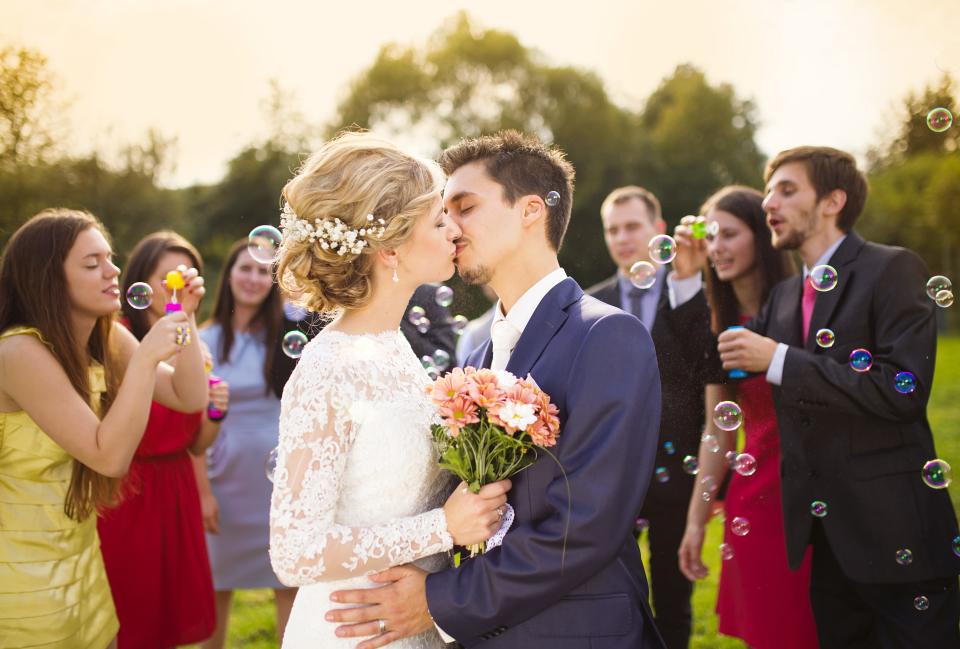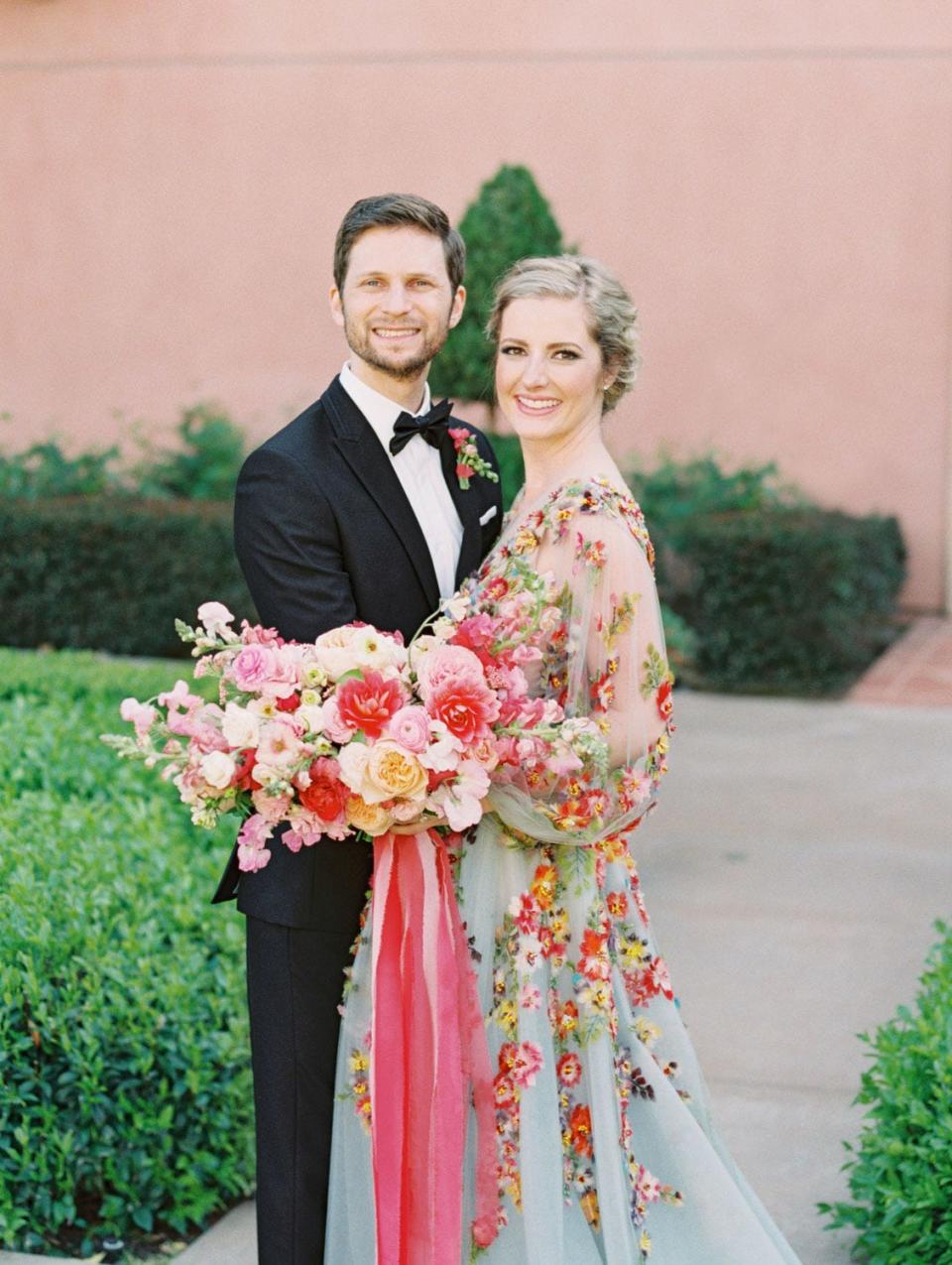Weddings without gender? More couples want to de-gender how they tie the knot
A sweeping white gown. A teary-eyed father walking his daughter down the aisle. A vow to "love, honor and obey."
When most people picture summer wedding season, familiar memories of classic traditions like these may come to mind.
But many tropes that come with tying the knot have had major makeovers in recent years, as more couples opt to reimagine – or completely jilt – wedding traditions that revolve around gender.
From who's allowed to be a bridesmaid or groomsman – and what you call them – to who gets walked down the aisle, more traditions are getting modern twists, as couples seek to be more inclusive of the LGBTQ community and consistent with a feminist view of gender.
Plus, in the age of COVID-19, couples are reevaluating what is important to them, and ditching traditions doesn't just allow them to flex their creativity. It allows them to host ceremonies more aligned with their values.
"There are a lot of rules and etiquette around weddings, and a lot of them are, frankly, sexist and outdated, and they need to be rethought," says Amy Shack Egan, a wedding planner in Brooklyn, New York. "I've seen couples get so creative and make choices that really feel right for themselves and their partnership so that a wedding can actually feel empowering."
Here's how couples are choosing to de-gender wedding traditions – and why some wedding experts say the changes may be for the best.

Wedding parties, other traditions get gender-neutral spin
Though couples make varied decisions on which practices to include at their weddings, planners agree two traditions are on the way out: The bride tossing her bouquet to her single female friends, and the husband removing his wife's garter in front of all their guests.
"Anything that feels super gendered or patriarchal or anything that supports the notion that women are property to be handed off from one man to another man – all those things are things that have been questioned," says Cindy Savage, a wedding planner based in Seattle.
When it comes to other traditions – like the bride wearing white – couples differ in their approaches.
For Cavin Elizabeth, a wedding photographer based in San Diego, who got married in 2019, a white dress "did not feel like it honored my personality," she says. Instead, she opted for a blue gown with vibrant floral patterns. She also declined to take her husband's last name, with the aim of "not giving in to the system of patriarchy."
"A poofy, fairytale white dress might actually feel really empowering and awesome for somebody, and for somebody else, it might feel like a cage," Egan says. "So you have to decide what's right for you."

One tradition that can be more difficult to ditch is the bride's father walking her down the aisle to symbolically give her away to her groom. In a June YouGov poll of 700 Americans who have been married, 64% said they think the tradition of the bride's father, or another male, giving her away should be maintained.
But it's not because brides necessarily want to be traded from one man to another – they just don't want to hurt their parents' feelings.
Minneapolis-based marketing director Megan Westman says she would have skipped this tradition for her wedding in 2020 but kept it because it was important to her dad.
"Just the context of it seems like, why would you give a person away?" she says. "But I just loved the idea of something special for my parents, because it was a really big day for them, too."
Some couples are more inclusive with their wedding parties, not letting gender determine who gets to be a bridesmaid and who a groomsman, and calling them whatever they want.
"Across the board, there is a lot more trending towards inclusivity, and I think that is reflected in changing up traditions," Savage says.
Despite de-gendered trends becoming more popular among couples, the $51 billion wedding services industry is still playing catch up when it comes to inclusion, says Laura Reitsma, whose company Fierce Productions specializes in nontraditional celebrations.
According to a 2018 Community & Marketing Insights survey of same-sex and queer-identified couples, 83% of respondents said it was important to see other LGBTQ couples on a wedding vendor’s website for them to consider doing business with them.
"I've definitely seen an uptick in the last couple of years, with more of the Gen Z, the younger folk who are getting married, getting engaged and coming to me because they're realizing the wedding industry is still extremely binary," she says. "They're not seeing themselves represented in a lot of publications, a lot of websites, documents, photos, so they come to us to create their own traditions."
#WeddingFail: Mother-in-law wore wedding dress to son's big day, but bride wasn't mad
Actually, gendered wedding traditions aren't even that traditional
Many may balk at the idea of de-gendering weddings, but Stephanie Coontz, the director of research at the Council on Contemporary Families and author of the 2006 book "Marriage, A History: How Love Conquered Marriage," says structuring wedding ceremonies around gender is a relatively recent phenomenon.
For much of history, Coontz says, wedding traditions had more to do with class and social status than with gender. That changed, she says, during the 19th century, as men began to work away from the household while women were confined to the domestic sphere.
These traditions, she says, "reflected this new emphasis on gender as the most important division between people, more important than class."
In the 1970s and '80s, more women joined the workforce, causing people's notions of gender, relationships and family structures to shift. And though many may consider weddings simply as a fun party, Coontz says the traditions surrounding them reveal deeper cultural and social attitudes.
"Rituals tend to reinforce certain expectations," she says. "Asking the father for the woman's hand in marriage reflects an idea that men initiate and that men dispose. And increasingly, people are wanting to find rituals that reinforce more egalitarian and more outgoing ways of organizing romantic relationships and family relationships."
Staying Apart, Together: Why a Zoom wedding can be just as good as a regular wedding
Not every couple fits into gender norms
The 2015 legalization of same-sex marriage across the United States has also cast gendered traditions in a new light.
Christina Stewart and Amanda Taylor of Lansing, Michigan, who wed at sunrise in Montana's Glacier National Park in July, said these traditions can be especially tricky for same-sex couples.
"It's just hard because there's not really a template for it, and everything you see is very gendered, and that obviously didn't fit necessarily who we are," Taylor says. "I even feel like I caught myself buying into a lot of the traditional things because that's just how it's supposed to be."

According to Savage, who planned the couple's wedding and officiated the ceremony, the movement away from gendered traditions signals more awareness of the LGBTQ community,
"It really mirrors the trajectory of LGBT rights progress and marriage equality progress through the country," she says. "Younger generations are so much more open and embracing of fluidity, both in gender identity and in sexual orientation. There's a real desire to be inclusive, even if they themselves are not queer or gender-queer."
COVID made weddings more intentional
Another factor in people reconsidering tradition is the COVID-19 pandemic, which forced many people to cancel, postpone or downsize their ceremonies. As a result, couples have reconsidered which traditions are most important to them.
Savage says COVID-19 has made people more intentional in their planning.
"It's made people have to really think about who do I want there and what can or will this celebration look like," she says.
Weddings are for couples, not society
Perhaps most important, planners say, the trend away from gendered traditions means people are thinking more deeply about weddings and what the ceremony means to them. Tweaking traditions to include people of any gender, or to give women more agency, they say, only makes the day more special.
"It signals a generation of folks that are willing to question the status quo and willing to push against etiquette for the sake of just etiquette," Egan says. "There's just more and more people asking the why behind the traditions and making sure that it feels validating and good for them before they decide to do it."
Reconciling tradition with progress, Westman says, is something everyone must consider, whether or not they walk down the aisle one day.
"In every aspect of life, there's that balance between how things have been done in the past and evolving and making new traditions," she says. "A lot of the traditions are sexist and are geared towards your male-female couple, and I don't think it needs to be like that. I think people are recognizing that it's OK to go away from that."
Why marriage is still a sexist institution – and what we can do about it
This article originally appeared on USA TODAY: Weddings going gender neutral? How couples are reimagining traditions

